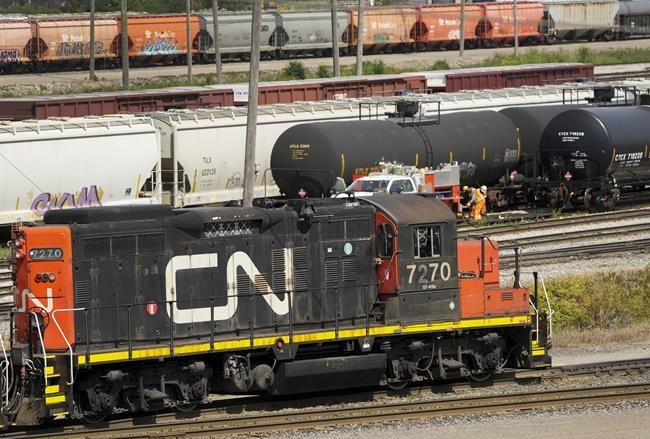In the wake of the resignation of Canadian National Railway Co.'s Indigenous advisory council, experts say corporate sa���ʴ�ý needs to do some soul-searchingand decide if it is serious about reconciliation.
Shannin Metatawabin, CEO of the National Aboriginal Capital Corporations Association — an umbrella group for more than 50 Indigenous financial institutions across the country — said what most corporate leaders have so far failed to grasp is that sa���ʴ�ý is a very wealthy country, developed at the expense of Indigenous people who have been excluded and left in a state of poverty.
"They need to acknowledge that we've been excluded from the economy and that there are steps that they can actively take to make sure that Indigenous people are included in that in the new economy going forward," he said.
CN Rail's entire Indigenous advisory council collectively announced their resignations Monday, saying the company has failed to follow the panel's advice on reconciliation.
The railway is just one of a number of major Canadian corporations that have appointed Indigenous advisory councils in the last few years in response to a call to action by the federal Truth and Reconciliation Commission.
That recommendation called on the corporate sector to commit to meaningful consultation and respectful relationships with Indigenous people, and to ensure they have equitable access to jobs, training, and education opportunities as well as long-term sustainable benefits from economic development projects.
But Indigenous business experts say these goals remain far off, as evidenced by what happened at CN this week.
"CN really shot themselves in the foot here, because they asked for ideas, and when they received the ideas, they shot them down," said Jason Bird, program co-ordinator for Indigenous business and public administration at the First Nations University of sa���ʴ�ý in Regina.
"This is when reconciliation fails. This is when Indigenous people turn around and say, 'Yes, this is just like all the false promises we've seen from other companies and governments before.'"
Metatawabin, meanwhile, said he's not convinced Canadian business leaders are making significant strides toward reconciliation.
This is in spite of the fact that land acknowledgments and traditional blessings are becoming commonplace at corporate functions.
"What we've experienced to date is check-box engagements," Metatawabin said.
"It's the minimum engagement with the Indigenous community — attending a dinner, making a corporate sponsorship to an Indigenous initiative or something. That is as much as corporate sa���ʴ�ý has done to date, and that's really not an impact at all."
CN said Monday it has put together a team of nine managers that includes Indigenous and regional representation to foster respectful relationships with Indigenous communities and help senior executives develop the railway's "reconciliation action plan."
The company said it had planned to release the plan next year with "specific, measurable initiatives" followed by regular updates on its performance versus its goals.
But Murray Sinclair, a former senator and head of the Truth and Reconciliation Commission as well as co-chair of CN's Indigenous advisory council, said the council had recommended the company implement an apology framework for the role the railway played in colonization.
He said it became clear CN was not going to apologize.
Other companies with Indigenous advisory councils include Telus Corp., Bank of Montreal, the ATCO Group, Suncor Energy Inc. and TC Energy Corp.
Dawn Madahbee Leach, chair of the National Indigenous Economic Development Board, said the concept is becoming relatively commonplace as companies seek to improve their ESG (environmental, social, governance) profiles.
While she said she believes some companies are very sincere and want to engage with Indigenous people, they need to understand why apologies or acknowledgment of past harm is important.
"Even in our personal lives, if somebody wants to reconcile with you, then they need to acknowledge the wrong that was done, right?" Madahbee Leach said.
"That formal acknowledgment is a really critical part of reconciliation."
Experts also say corporate sa���ʴ�ý needs to move beyond window dressing to real action. It's not enough to put Indigenous art in the lobby or change the name of a building, they say — economic reconciliation means providing ways for Indigenous people to be prosperous.
That includes things like setting targets for Indigenous representation at the board level and hiring targets across the organization. It can include procurement agreements to ensure Indigenous-owned businesses are being granted fair access to corporate contracts.
It also means access to capital. While a federal Indigenous loan guarantee program like that promised in the Trudeau government's fall economic statement is helpful, Metatawabin said, there are other financial tools that could help Indigenous communities invest in economic development opportunities.
These could include making financing more accessible through a revolving equity fund or a national Indigenous business development bank. Tax incentives for corporations that invest in local Indigenous communities would also be a benefit, he added.
Bird said while appointing an Indigenous advisory council will backfire on companies that aren't genuinely willing to implement the advice they receive, it's a good idea for any company that knows it has work to do on reconciliation and is willing to learn.
"I think anybody that comes toward it in a good way, in an honest way, with integrity is never going to have an issue," he said.
"It's about being able to say, 'We did this before, but let's try something different now.' "
This report by The Canadian Press was first published Dec. 12, 2023.
Companies in this story: (TSX:CNR)
Amanda Stephenson, The Canadian Press



